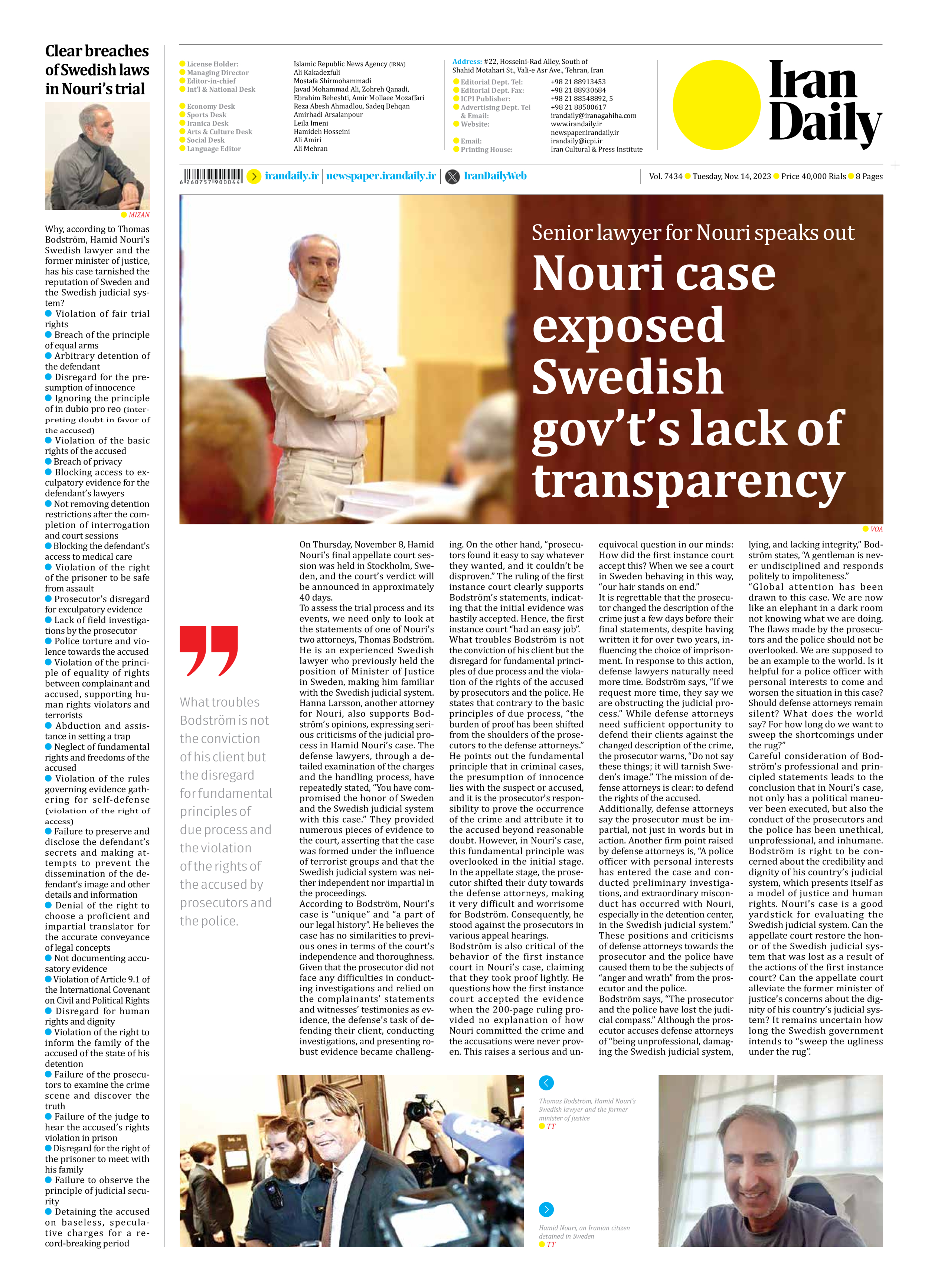
Senior lawyer for Nouri speaks out
Nouri case exposed Swedish gov’t’s lack of transparency
On Thursday, November 8, Hamid Nouri’s final appellate court session was held in Stockholm, Sweden, and the court’s verdict will be announced in approximately 40 days.
To assess the trial process and its events, we need only to look at the statements of one of Nouri’s two attorneys, Thomas Bodström. He is an experienced Swedish lawyer who previously held the position of Minister of Justice in Sweden, making him familiar with the Swedish judicial system.
Hanna Larsson, another attorney for Nouri, also supports Bodström’s opinions, expressing serious criticisms of the judicial process in Hamid Nouri’s case. The defense lawyers, through a detailed examination of the charges and the handling process, have repeatedly stated, “You have compromised the honor of Sweden and the Swedish judicial system with this case.” They provided numerous pieces of evidence to the court, asserting that the case was formed under the influence of terrorist groups and that the Swedish judicial system was neither independent nor impartial in the proceedings.
According to Bodström, Nouri’s case is “unique” and “a part of our legal history”. He believes the case has no similarities to previous ones in terms of the court’s independence and thoroughness. Given that the prosecutor did not face any difficulties in conducting investigations and relied on the complainants’ statements and witnesses’ testimonies as evidence, the defense’s task of defending their client, conducting investigations, and presenting robust evidence became challenging. On the other hand, “prosecutors found it easy to say whatever they wanted, and it couldn’t be disproven.” The ruling of the first instance court clearly supports Bodström’s statements, indicating that the initial evidence was hastily accepted. Hence, the first instance court “had an easy job”.
What troubles Bodström is not the conviction of his client but the disregard for fundamental principles of due process and the violation of the rights of the accused by prosecutors and the police. He states that contrary to the basic principles of due process, “the burden of proof has been shifted from the shoulders of the prosecutors to the defense attorneys.” He points out the fundamental principle that in criminal cases, the presumption of innocence lies with the suspect or accused, and it is the prosecutor’s responsibility to prove the occurrence of the crime and attribute it to the accused beyond reasonable doubt. However, in Nouri’s case, this fundamental principle was overlooked in the initial stage. In the appellate stage, the prosecutor shifted their duty towards the defense attorneys, making it very difficult and worrisome for Bodström. Consequently, he stood against the prosecutors in various appeal hearings.
Bodström is also critical of the behavior of the first instance court in Nouri’s case, claiming that they took proof lightly. He questions how the first instance court accepted the evidence when the 200-page ruling provided no explanation of how Nouri committed the crime and the accusations were never proven. This raises a serious and unequivocal question in our minds: How did the first instance court accept this? When we see a court in Sweden behaving in this way, “our hair stands on end.”
It is regrettable that the prosecutor changed the description of the crime just a few days before their final statements, despite having written it for over two years, influencing the choice of imprisonment. In response to this action, defense lawyers naturally need more time. Bodström says, “If we request more time, they say we are obstructing the judicial process.” While defense attorneys need sufficient opportunity to defend their clients against the changed description of the crime, the prosecutor warns, “Do not say these things; it will tarnish Sweden’s image.” The mission of defense attorneys is clear: to defend the rights of the accused.
Additionally, defense attorneys say the prosecutor must be impartial, not just in words but in action. Another firm point raised by defense attorneys is, “A police officer with personal interests has entered the case and conducted preliminary investigations, and extraordinary misconduct has occurred with Nouri, especially in the detention center, in the Swedish judicial system.” These positions and criticisms of defense attorneys towards the prosecutor and the police have caused them to be the subjects of “anger and wrath” from the prosecutor and the police.
Bodström says, “The prosecutor and the police have lost the judicial compass.” Although the prosecutor accuses defense attorneys of “being unprofessional, damaging the Swedish judicial system, lying, and lacking integrity,” Bodström states, “A gentleman is never undisciplined and responds politely to impoliteness.”
“Global attention has been drawn to this case. We are now like an elephant in a dark room not knowing what we are doing. The flaws made by the prosecutors and the police should not be overlooked. We are supposed to be an example to the world. Is it helpful for a police officer with personal interests to come and worsen the situation in this case? Should defense attorneys remain silent? What does the world say? For how long do we want to sweep the shortcomings under the rug?”
Careful consideration of Bodström’s professional and principled statements leads to the conclusion that in Nouri’s case, not only has a political maneuver been executed, but also the conduct of the prosecutors and the police has been unethical, unprofessional, and inhumane. Bodström is right to be concerned about the credibility and dignity of his country’s judicial system, which presents itself as a model of justice and human rights. Nouri’s case is a good yardstick for evaluating the Swedish judicial system. Can the appellate court restore the honor of the Swedish judicial system that was lost as a result of the actions of the first instance court? Can the appellate court alleviate the former minister of justice’s concerns about the dignity of his country’s judicial system? It remains uncertain how long the Swedish government intends to “sweep the ugliness under the rug”.







